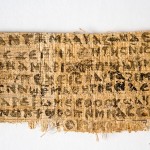Vatican: “Gospel of Jesus’ Wife” Fragment a Fake
An ancient papyrus fragment which a Harvard scholar says contains the first recorded mention that Jesus may have had a wife is a fake, the Vatican said on Friday.
"Substantial reasons would lead one to conclude that the papyrus is indeed a clumsy forgery," the Vatican's newspaper, L'Osservatore Romano, said in an editorial by its editor, Gian Maria Vian. "In any case, it's a fake."
Joining a highly charged academic debate over the authenticity of the text, written in ancient Egyptian Coptic, the newspaper published a lengthy analysis by expert Alberto Camplani of Rome's La Sapienza university, outlining doubts about the manuscript and urging extreme caution.
The fragment, which reads "Jesus said to them, my wife" was unveiled by Harvard Professor Karen King as a text from the 4th century at a congress of Coptic Studies in Rome last week.
Her study divided the academic community, with some hailing it as a landmark discovery while others rapidly expressed their doubts.
"It's really pretty unlikely that it's authentic," University of Durham Professor Francis Watson told Reuters after he published a paper arguing the words on the fragment were a rearrangement of phrases from a well known Coptic text.
Watson, who has previously worked on identifying forged gospels, said it was likely to be an ancient blank fragment that was written over in the 20th or 21st century by a forger seeking to make money.
Watson argues the words on the fragment do not fit grammatically into a larger text.
"It's possible to get hold of an old bit of un-written on papyrus and write some new stuff on it," Watson said. "There is a market for fake antiquities throughout the Middle East ... I would guess that in this case the motivation might have been a financial one."
Manuscript experts who heard King's presentation quickly took to their blogs to express doubts, noting that the letters were clumsy, perhaps the script of someone unused to writing Coptic.
Writing from the conference, early Christian scholar Christian Askeland said specialists there were divided between two-thirds who were extremely skeptical, and one-third convinced the fragment was false.
"I have not met anyone who supports its authenticity," Askeland wrote from a session of the Tenth International Congress of Coptic Studies, where King gave her paper.
